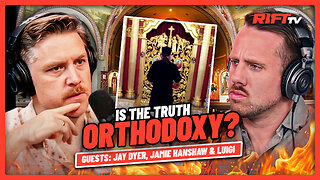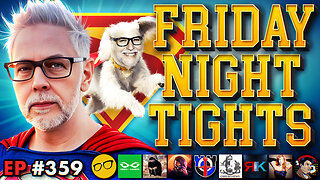Premium Only Content

What is ALTERNATIVE ROCK?
✪✪✪✪✪
http://www.theaudiopedia.com
✪✪✪✪✪
What does ALTERNATIVE ROCK mean? ALTERNATIVE ROCK meaning - ALTERNATIVE ROCK definition - ALTERNATIVE ROCK explanation. What is the meaning of ALTERNATIVE ROCK? What is the definition of ALTERNATIVE ROCK? What does ALTERNATIVE ROCK stand for? What is ALTERNATIVE ROCK meaning? What is ALTERNATIVE ROCK definition?
Alternative rock (also called alternative music, alt-rock or simply alternative) is a genre of rock music that emerged from the independent music underground of the 1980s and became widely popular in the 1990s and 2000s. In this instance, the word "alternative" refers to the genre's distinction from mainstream rock music. The term's original meaning was broader, referring to a generation of musicians unified by their collective debt to either the musical style or simply the independent, D.I.Y. ethos of punk rock, which in the late 1970s laid the groundwork for alternative music. At times, "alternative" has been used as a catch-all description for music from underground rock artists that receives mainstream recognition, or for any music, whether rock or not, that is seen to be descended from punk rock (including some examples of punk itself, as well as new wave, and post-punk).
Alternative rock is a broad umbrella term consisting of music that differs greatly in terms of its sound, its social context, and its regional roots. By the end of the 1980s magazines and zines, college radio airplay, and word of mouth had increased the prominence and highlighted the diversity of alternative rock, helping to define a number of distinct styles (and music scenes) such as gothic rock, jangle pop, noise pop, indie rock, indie pop, grunge, industrial rock, alternative hip hop, and rap rock. Most of these subgenres had achieved minor mainstream notice and a few bands representing them, such as Hüsker Dü and R.E.M., had even signed to major labels. But most alternative bands' commercial success was limited in comparison to other genres of rock and pop music at the time, and most acts remained signed to independent labels and received relatively little attention from mainstream radio, television, or newspapers. With the breakthrough of Nirvana and the popularity of the grunge and Britpop movements in the 1990s, alternative rock entered the musical mainstream and many alternative bands became successful.
By the end of the decade, alternative rock's mainstream prominence declined due to a number of events that caused grunge and Britpop to fade and led to the hiatus of the Lollapalooza festival. Nevertheless, post-grunge remained commercially viable into the start of the 21st century, with the commercial success of Creed and Matchbox Twenty; Radiohead's critical acclaim, and the success of some post-Britpop groups like Coldplay. Emo attracted attention in the larger alternative rock world, and the term was applied to a variety of artists, including multi-platinum acts. During the late 1990s and early 2000s, several alternative rock bands emerged, including The White Stripes, The Strokes, Arcade Fire, Franz Ferdinand, and Interpol, that drew from post-punk and new wave. Post-punk revival artists such as Modest Mouse and The Killers had commercial success in the early and mid 2000s.
-
 2:28
2:28
The Audiopedia
1 year agoWhat is MORTGAGE BROKER?
22 -
 LIVE
LIVE
GritsGG
8 hours agoWSOW Qualifiers! 👑 2587+ Ws
189 watching -
 48:09
48:09
Glenn Greenwald
7 hours agoGlenn Takes Your Questions on War with Iran, Executive Power, the Trump Presidency, and More | SYSTEM UPDATE #473
102K17 -
 DVR
DVR
RiftTV/Slightly Offensive
4 hours agoIs ORTHODOXY the TRUE Church of Christ? | The Rift | Guests: Jay Dyer, Jamie Hanshaw + Luigi
17K3 -
 LIVE
LIVE
a12cat34dog
2 hours agoFINISHING THIS CLASSIC :: God of War (2005) :: FIRST-TIME PLAYING {18+}
95 watching -
 3:55:01
3:55:01
Nerdrotic
5 hours ago $7.97 earnedMarvel's Doom Loop, Superman's James Gunn Looks Down? 28 Years Later | Friday Night Tights 359
51.6K16 -
 LIVE
LIVE
Edge of Wonder
4 hours agoAntarctica Secrets: Radio Signals that Defy Physics & ChatGPT Lying
486 watching -
 LIVE
LIVE
Midnight In The Mountains
4 hours agoGaming w/ PER·SE·VER·ANCE | 1K Celebration Stream | Gears Beta Round 2
24 watching -
 9:20
9:20
WhaddoYouMeme
22 hours ago $0.34 earnedThe BRUTAL 5-Step Trap Keeping Christians Watching P*rn
8.84K7 -
 LIVE
LIVE
LFA TV
23 hours agoLFA TV ALL DAY STREAM - FRIDAY 6/20/25
637 watching